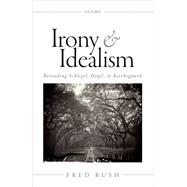
Irony and Idealism Rereading Schlegel, Hegel, and Kierkegaard
by Rush, FredBuy New
Rent Textbook
Rent Digital
Used Textbook
We're Sorry
Sold Out
Summary
Author Biography
Fred Rush, University of Notre Dame
Fred Rush teaches philosophy at the University of Notre Dame. He is the author of On Architecture (Routledge, 2009), the editor of the Cambridge Companion to Critical Theory (CUP, 2004), and for ten years edited the annual Internationales Jahrbuch des Deutschen Idealismus.
Table of Contents
Acknowledgments
Note on text, references, and translation
Introductory remarks
1. Jena romanticism and the philosophical significance of irony
2. Irony displaced, or Hegel
3. Irony redivivus, or Kierkegaard
Irony redivivus, or Kierkegaard
Appendix
Bibliography
Index
An electronic version of this book is available through VitalSource.
This book is viewable on PC, Mac, iPhone, iPad, iPod Touch, and most smartphones.
By purchasing, you will be able to view this book online, as well as download it, for the chosen number of days.
Digital License
You are licensing a digital product for a set duration. Durations are set forth in the product description, with "Lifetime" typically meaning five (5) years of online access and permanent download to a supported device. All licenses are non-transferable.
More details can be found here.
A downloadable version of this book is available through the eCampus Reader or compatible Adobe readers.
Applications are available on iOS, Android, PC, Mac, and Windows Mobile platforms.
Please view the compatibility matrix prior to purchase.
